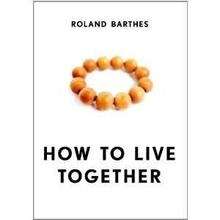How to Live Together

Editorial Columbia
Fecha de edición diciembre 2012 · Edición nº 1
Idioma inglés
Traducción de Briggs, Kate
EAN 9780231136174
224 páginas
Libro
encuadernado en tapa blanda
Resumen del libro
In The Preparation of the Novel, a collection of lectures delivered at a defining moment in Roland Barthes's career (and completed just weeks before his death), the critic spoke of his struggle to discover a different way of writing and a new approach to life. The Neutral preceded this work, containing Barthes's challenge to the classic oppositions of Western thought and his effort to establish new pathways of meaning. How to Live Together predates both achievements, a series of lectures exploring solitude and the degree of contact necessary for individuals to exist and create at their own pace. A distinct project that sets the tone for his subsequent lectures, How to Live Together is a key introduction to Barthes's pedagogical methods and critical worldview.
Barthes focuses on the concept of idiorrhythmy, a productive form of living together in which one recognizes and respects the individual rhythms of the other. He explores this phenomenon in five texts representing different living spaces and their associated ways of life: Émile Zola's Pot-Bouille, set in a Parisian apartment building; Thomas Mann's The Magic Mountain, which takes place in a sanatorium; André Gide's La Séquestrée de Poitiers, based on the true story of a woman confined to her bedroom; Daniel Defoe's Robinson Crusoe, about a castaway on a remote island; and Pallidius's Lausiac History, on the ascetic lives of the desert fathers. As with his previous lecture books, How to Live Together exemplifies Barthes's singular approach to teaching, in which he invites his audience to investigate with him, or for him, and wholly incorporates them into his discoveries. Rich with playful observations and suggestive, clarifying prose, How to Live Together is a foundational text orienting English-speaking readers to the full power of Barthes's intellectual adventures
Biografía del autor
Roland Barthes (Francia, 1915 x{0026} x02013; 1980) escritor y uno de los semiólogos franceses más relevantes del siglo XX. En la Universidad de París obtuvo las titulaciones de Letras Clásicas, Gramática y Filosofía. En 1934 se le diagnostica una tuberculosis que lo mantiene ingresado en diversos sanatorios durante más de diez años. Fue lector en las universidades de Alejandría y Budapest y posteriormente trabajó como investigador en lexicología y sociología en el Centro Nacional de Investigación Científica de París. Roland Barthes es autor de más de veinte estudios de semiótica estructuralista, análisis crítica de la obra literaria pero también de libros sobre fotografía, música, arte y cine. Entre sus obras destacan: La cámara lúcida. Nota sobre la fotografía, también aparecido en Paidós, editorial que ha publicado igualmente compilaciones de sus escritos como Lo obvio y lo obtuso. Imágenes, gestos, voces, El susurro del lenguaje, La aventura semiológica, La Torre Eiffel. Textos sobre la imagen y Variaciones sobre la lectura. Recientemente Ediciones Paidós ha publicado Del deporte y los hombres, estudio perteneciente a la documentación para un film documental, inédito en lengua castellana (colección El arco de Ulises). Barthes murió en 1980 víctima de un accidente de coche cerca de la Sorbona, en París.<br> Ediciones Paidós recupera en la Biblioteca Roland Barthes, con una nueva presentación, los textos más importantes del semiólogo francés. Los dos primeros títulos que inauguran la colección son La aventura semiológica y Lo obvio y lo obtuso.







